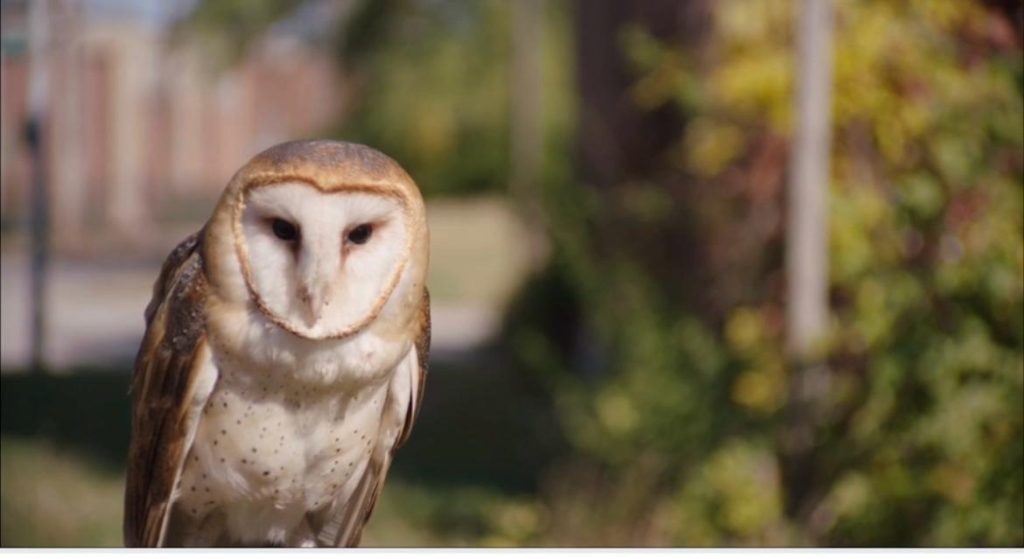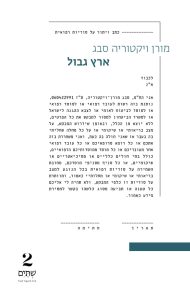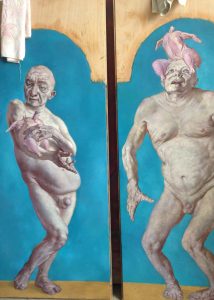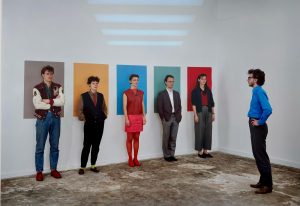Click Here For English
הרחקת עדות היא אסטרטגיה שכיחה לדבר על הווה כאוב דרך דיון במקום או זמן אחר במנעד רחב ביותר מנרטיב היסטורי ועד למדע בדיוני. “פלישות” של דנה לוי עושה בדיוק את זה ולכן התערוכה מצליחה להישאר במחשבה, להטריד ולהעסיק הרבה יותר מלא מעט עבודות ויוזמות אמנות שנעשו בשנה החולפת, מאז פרוץ המלחמה. בעת שהמציאות היא פצע מבעבע כמעט בלתי אפשרי לבקר עבודות ויוזמות שכאלו בכלים המקובלים של ביקורת אמנות.



נקודת המוקד החזותית והרעיונית ב “פלישות” היא עבודת הווידיאו Mississippians מיסיסיפיאנס, שלוי יצרה בסנט לואיס, מיזורי. בשכונה מתפוררת, שפאר עברה ניכר היטב, כשבעלי חיים מסתובבים ברחובות וצמחייה מכסה ומכלה ומעכלת מבנים. העבודה ממשיכה את העבודות המוקדמות של לוי כמו “התנתקות”, 2005, בו בית על עץ נבנה ומתפרק (והתייחס ליציאה מעזה שנעשתה באותה שנה) ו” דוממים בינינו” מ 2008 בו להקת יונים התעופפה במוזיאון הטבע על-שם חיים שטורמן בעין חרוד. היא המשיכה את העיסוק בדיכטומיות חיים ומוות, טבע ותרבות באופן מתוחכם יותר ואפקטיבי לא פחות בתערוכה Dead World Order עליה כתבתי ב 2012. התערוכה הנוכחית מרחיבה את שדה החשיבה ושואלת שאלות שכורכות יחד היבטים חברתיים כלכליים אבל גם את צילו הארוך של משבר האקלים שבשני העשורים שחלפו מאז החלה להציג הפך מי תיאורטי לנוכחות יומיומית עבור אנשים ברחבי העולם.
סיור 28/8/24, יום רביעי אחה"צ
סיפור התדרדרות השכונה בו צולמה העבודה הוא כסיפורן של שכונות רבות בארה”ב וכנראה במדינות רב גזעיות נוספות. גזענות מוסדית שתורגמה לקיפוח בהקצאת משאבים לאחר שאפרואמריקאים עברו לשכונה שבתורה הובילה לדעיכה של אזור שלם והפיכתו למפגע שיש לו גם היבטים אקולוגיים. אלו לא נשארים רק בתחום הגאוגרפי של השכונה – הפגיעה המכוונת באוכלוסייה אחת פוגעת במערכת כולה. הדוגמא הישראלית העולה מיד על הדעת היא גידול אוכלוסיית חזירי הבר בחיפה אך וודאי שיש עוד רבות, בעבודה נוספת מוצגים היסטוריונים ותושבים של סנט לואיס המתארים את התהליכים לאורך שנים. היא גם מספרת את סיפורה של קהילה עירונית ילידית שחיה באזור, הגיעה לפריחה אורבנית מרשימה ביותר וקרסה לתוך עצמה בשל סכסוכים פנימיים שגרמו לזניחת מערכות הקיום שלה.קהילה זו נחקרת על ידי ארכאולוגים וממחישה עד כמה עליה וירידה של קהילות, וגם אימפריות שלמות, היא מאין תנועה מחזורית.


לוי עוסקת אפוא במעגלים של בנייה וכליה בעבודת המעוררות את השאלה מי הוא הפולש – האם “הטבע ” שהוזז וגורש כדי לבנות שכונה ושב ומשתלט על המרחב לאחר התפוררותה ? האם האנשים שנכנסים לגור בבתים מפוארים שנבנו בזכות מערכות קפיטליסטיות בלתי צודקות מתחילה (או על רווחי גזל) וננטשו הם פולשים?

בסצנות כמו נשרים בכנסייה נטושה לוי מהלכת קרוב מאד לשטיחות של אינספור סרטי קולנוע דיסטופיים כמו The Day After Tomorrow של Roland Emmerich מ 2004 או כוכב הקופים Planet of the Apes 1968 שמסתיים במראה של החזרה לניו יורק ההרוסה. לוי אינה חוצה את הקו בזכות מידה של ריסון וקו עדין של מודעות ואירוניה עצמית שנטועה בתולדות האמנות – הנשרים בכנסיה נשרי Bald eagle, הנשר הקירח שחי בצפון אמריקה והוא סמל אמריקאי. הנשר ומקודש למספר עמים ילידיים ווכשהם מתעופפים בתוך וסביב כנסייה נטושה היותם הסמל של האבנגליסט יוחנן הקדוש הופכת תזכורת קודרת לכישלון של הבשורה הנוצרית לגאול את “העולם החדש”. אם יש גאולה, כמו אומרת העבודה, היא אינה מאידאולוגיות גדלות, מדת או לאומיות זו או אחרת. הסרט משובץ בדימויים יפים, כמו חורבות שנבנו במיוחד בגנים מעוצבים היטב בעידן הרומנטי ועידן ההארה. הדימויים היפים מסממנים את המרחק ממנו אנחנו מתבוננים במציאות עד שהיא מתדפקת על דלתנו ממש.
את ההשלכות על ההווה הישראלי משאירה לוי, ומשאיר טקסט התערוכה, לצופה.
התערוכה היא חלק ממסלול הסיור הנערך ב 28/8. לפרטים לחצו כאן
אוצרת: עדי גורה
גלריה ברוורמן, תל אביב

Dana Levy: Intrusions
Exclusion of testimony is a common strategy for talking about a painful present by discussing a different time or place from a broader swath of historical narrative through science fiction. Dana Levy’s “Intrusions” accomplishes this which is why the exhibition’s success lingers in one’s thoughts, disturbing and engaging, more than much of the art made post the beginning of the October 7th war and employing its direct imagery. As long as the current reality is a still throbbing wound it is almost impossible to write critically about artworks using the usual tools of art criticism.
Levy’s video Mississippians is the visual and philosophical focal point of “Intrusions.” She made the video in St. Louis, Missouri, in a crumbling neighbourhood still silver lined with remains of its days of glory. Animals roam the streets in which vegetation covers and destroys buildings. The piece continues her earlier works, such as Disengagement (2005) in which a house on a tree is constructed then deconstructed (referring to the disengagement from Gaza that year), and Silent Among Us (2008) in which a flock of doves fly through the Beit Shturman Museum of natural history, Ein Harod. Levy explored the dichotomies of life/death and nature/culture in an the even more sophisticated and no less effective Dead World Order which I wrote about in 2012. The current exhibition expands the field of thought by asking questions combining socioeconomic aspects with the long shadow of the climate crisis, which in the two decades since Levy began exhibiting has changed from a theoretical issue to a constant presence, of growing urgency for people all over the world.


The story of the decline of the neighbourhood where Levy filmed Mississippians is the story of numerous neighbourhoods all over the USA as well as in other multiracial countries. Institutional racism translated into unequal distribution of resources after African Americans moved into a formerly all-white neighbourhood which in turn led to the decline of the entire neighbourhood as the whites moved out, and the neighbourhood became an eyesore as well as an ecological disaster. The problems do not remain confined to grounds of neighbourhood – thus the deliberate discrimination against one sector of the population injures the entire system. The conspicuous Israeli example that immediately comes to mind is the problem of the wild pigs in Haifa.
In another, adjacent video, historians and residents of St. Louis describe the processes that took place over the years. It also relates the story of a community of urban Native Americans living in the area which developed an impressive urban life then collapsed due to internal conflicts that caused the residents to neglect their own systems essential for their existence. The community is being researched by archaeologists, illustrating how the rise and fall of communities – just like entire empires – is a cyclical movement.
Levy therefor engages in cycles of construction and destruction in works that ask, “Who is the intruder?” – is it the “nature” displaced and removed to build a new neighbourhood which retakes the space after the buildings decay? Do the people who come to live in luxury houses built from their very inception by unjust capitalistic systems or on ill-gotten gains are they the intruders? Or are the squatters?
In scenes such as vultures in an abandoned church, Levy comes very close to conventional dystopia movies such as The Day After Tomorrow (2004, dir. Roland Emmerich) or Plant of the Apes (1968, dir. Franklin J. Schaffner), too numerous to mention.
Levy does not fall into that pit thanks to her restraint, self-awareness and irony as well as being firmly embedded in art history. The eagles in the church are Bald Eagles – symbol of the USA and a bird sacred to many Indigenous peoples. It is also the attribute of St. John. If there is to be Redemption, the work states, it will not arise from any grand ideology, religion, or nationalism.
The work is studded with beautiful images like the faux ruins that adorned in well-designed gardens of the Romantic Era or the Age of Enlightenment. They delight the eye, have a calming effect, and remind us of the distance from where we observe reality until it knocks on our door.
The exhibition leaves the implications concerning the present to the viewer.
Curator: Adi Gura
Braverman Gallery









